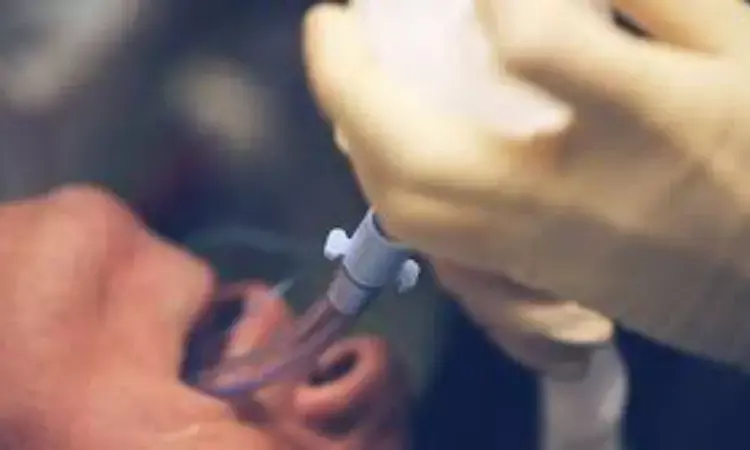- Home
- Medical news & Guidelines
- Anesthesiology
- Cardiology and CTVS
- Critical Care
- Dentistry
- Dermatology
- Diabetes and Endocrinology
- ENT
- Gastroenterology
- Medicine
- Nephrology
- Neurology
- Obstretics-Gynaecology
- Oncology
- Ophthalmology
- Orthopaedics
- Pediatrics-Neonatology
- Psychiatry
- Pulmonology
- Radiology
- Surgery
- Urology
- Laboratory Medicine
- Diet
- Nursing
- Paramedical
- Physiotherapy
- Health news
- Fact Check
- Bone Health Fact Check
- Brain Health Fact Check
- Cancer Related Fact Check
- Child Care Fact Check
- Dental and oral health fact check
- Diabetes and metabolic health fact check
- Diet and Nutrition Fact Check
- Eye and ENT Care Fact Check
- Fitness fact check
- Gut health fact check
- Heart health fact check
- Kidney health fact check
- Medical education fact check
- Men's health fact check
- Respiratory fact check
- Skin and hair care fact check
- Vaccine and Immunization fact check
- Women's health fact check
- AYUSH
- State News
- Andaman and Nicobar Islands
- Andhra Pradesh
- Arunachal Pradesh
- Assam
- Bihar
- Chandigarh
- Chattisgarh
- Dadra and Nagar Haveli
- Daman and Diu
- Delhi
- Goa
- Gujarat
- Haryana
- Himachal Pradesh
- Jammu & Kashmir
- Jharkhand
- Karnataka
- Kerala
- Ladakh
- Lakshadweep
- Madhya Pradesh
- Maharashtra
- Manipur
- Meghalaya
- Mizoram
- Nagaland
- Odisha
- Puducherry
- Punjab
- Rajasthan
- Sikkim
- Tamil Nadu
- Telangana
- Tripura
- Uttar Pradesh
- Uttrakhand
- West Bengal
- Medical Education
- Industry
Meta-analysis compares lidocaine and dexmedetomidine for reducing cough response during tracheal extubation during surgery

Recently published systematic review and meta-analysis compared the effectiveness of dexmedetomidine and lidocaine in reducing cough response after tracheal extubation in adult patients under general anesthesia. The primary outcome was the incidence of post-extubation cough, while secondary outcomes included emergence time, extubation time, residual sedation, and incidences of bradycardia. A comprehensive search of electronic databases was conducted, resulting in the inclusion of seven studies with 450 participants. The analysis revealed no significant difference in the incidence of cough, emergence time, and extubation time between dexmedetomidine and lidocaine. However, a higher incidence of bradycardia and residual sedation was observed in the dexmedetomidine group.
Comparative Analysis of Dexmedetomidine and Lidocaine
The included studies evaluated the administration of intravenous dexmedetomidine versus intravenous lidocaine during emergence from anesthesia. The route of administration of drugs was intravenous in all the included studies. The dose used for dexmedetomidine was 0.5 µg/kg, except for one study that used 0.1 µg/kg. For lidocaine, the dose used was 1.5 mg/kg in all studies except for one study that used 1 mg/kg. The meta-analysis revealed no significant difference in the incidence of post-extubation cough, emergence time, and extubation time between dexmedetomidine and lidocaine groups. However, a higher incidence of bradycardia and residual sedation was observed in the dexmedetomidine group compared to the lidocaine group.
Evaluation of Bias and Quality
The assessment of publication bias using the Begg test revealed no potential publication bias amongst the included trials. A subgroup analysis based on the technique of drug administration, timing of drug administration, or type of surgery revealed no significant difference between the two drugs. The quality of the included studies was evaluated using a modified Jadad score, and all included studies were found to be of high quality. Meta-regression analysis showed no statistically significant associations among key factors contributing to observed heterogeneity.
Conclusion and Further Studies Needed
Overall, the meta-analysis found no difference in the incidence of cough, emergence and extubation times between dexmedetomidine and lidocaine after tracheal extubation. However, it observed a higher incidence of residual sedation and bradycardia in the dexmedetomidine group compared to the lidocaine group. The review concluded that additional studies are needed to confirm the findings and establish conclusive evidence on the topic.
Key Points
- A meta-analysis compared the effectiveness of dexmedetomidine and lidocaine in reducing cough response after tracheal extubation in adult patients under general anesthesia. It included seven studies with 450 participants and found no significant difference in the incidence of post-extubation cough, emergence time, and extubation time between dexmedetomidine and lidocaine. However, a higher incidence of bradycardia and residual sedation was observed in the dexmedetomidine group.
- The studies evaluated the intravenous administration of dexmedetomidine versus lidocaine during emergence from anesthesia, with doses of 0.5 µg/kg for dexmedetomidine and 1.5 mg/kg for lidocaine. The meta-analysis revealed no significant difference in the primary and secondary outcomes between the two groups, but a higher incidence of bradycardia and residual sedation was observed in the dexmedetomidine group.
- Assessment of publication bias using the Begg test revealed no potential publication bias amongst the included trials. Additionally, the quality of the included studies was found to be high. However, the review concluded that additional studies are needed to confirm the findings and establish conclusive evidence on the topic.
Reference –
Purohit, Aanchal; Kumar, Mohan; Kumar, Niraj; Bindra, Ashish; Pathak, Sharmishtha1; Yadav, Anuradha2. Comparison between dexmedetomidine and lidocaine for attenuation of cough response during tracheal extubation: A systematic review and meta-analysis. Indian Journal of Anaesthesia 68(5):p 415-425, May 2024. | DOI: 10.4103/ija.ija_790_23.
MBBS, MD (Anaesthesiology), FNB (Cardiac Anaesthesiology)
Dr Monish Raut is a practicing Cardiac Anesthesiologist. He completed his MBBS at Government Medical College, Nagpur, and pursued his MD in Anesthesiology at BJ Medical College, Pune. Further specializing in Cardiac Anesthesiology, Dr Raut earned his FNB in Cardiac Anesthesiology from Sir Ganga Ram Hospital, Delhi.


